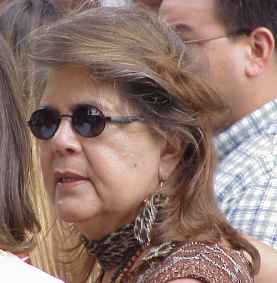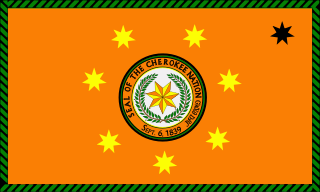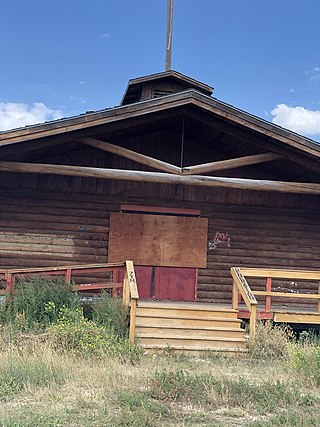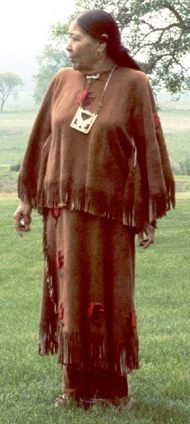
Tahlequah is a city in Cherokee County,Oklahoma located at the foothills of the Ozark Mountains. It is part of the Green Country region of Oklahoma and was established as a capital of the 19th-century Cherokee Nation in 1839,as part of the new settlement in Indian Territory after the Cherokee Native Americans were forced west from the American Southeast on the Trail of Tears.

The Bureau of Indian Affairs (BIA),also known as Indian Affairs (IA),is a United States federal agency within the Department of the Interior. It is responsible for implementing federal laws and policies related to Native Americans and Alaska Natives,and administering and managing over 55,700,000 acres (225,000 km2) of reservations held in trust by the U.S. federal government for indigenous tribes. It renders services to roughly 2 million indigenous Americans across 574 federally recognized tribes. The BIA is governed by a director and overseen by the Assistant Secretary for Indian Affairs,who answers to the Secretary of the Interior.

Wilma Pearl Mankiller was a Native American activist,social worker,community developer and the first woman elected to serve as Principal Chief of the Cherokee Nation. Born in Tahlequah,Oklahoma,she lived on her family's allotment in Adair County,Oklahoma,until the age of 11,when her family relocated to San Francisco as part of a federal government program to urbanize Native Americans. After high school,she married a well-to-do Ecuadorian and raised two daughters. Inspired by the social and political movements of the 1960s,Mankiller became involved in the Occupation of Alcatraz and later participated in the land and compensation struggles with the Pit River Tribe. For five years in the early 1970s,she was employed as a social worker,focusing mainly on children's issues.

Chadwick "Corntassel" Smith is a Native American politician and attorney who served as Principal Chief of the Cherokee Nation. He was first elected in 1999. Smith was re-elected to a second term as Chief in 2003 and a third term in June 2007 with 59% of the vote. He was defeated in his attempt to get elected to a fourth term in office by Bill John Baker 54% to 46% in the 2011 election and he lost again to Baker in 2015,receiving 28% of the vote. Prior to being elected Principal Chief,he worked as a lawyer for the tribe and in private practice.

The United Keetoowah Band of Cherokee Indians in Oklahoma is a federally recognized tribe of Cherokee Native Americans headquartered in Tahlequah,Oklahoma. According to the UKB website,its members are mostly descendants of "Old Settlers" or "Western Cherokee," those Cherokee who migrated from the Southeast to present-day Arkansas and Oklahoma around 1817. Some reports estimate that Old Settlers began migrating west by 1800. This was before the forced relocation of Cherokee by the United States in the late 1830s under the Indian Removal Act.
Jesse Bartley Milam (1884–1949) was best known as the first Principal Chief of the Cherokee Nation appointed by a U.S. president since tribal government had been dissolved before Oklahoma Statehood in 1907. He was appointed by President Franklin D. Roosevelt in 1941,who reappointed him in 1942 and 1943;he was reappointed by President Harry S. Truman in 1948. He died while in office in 1949.

The Cherokee Nation,also known as the Cherokee Nation of Oklahoma,is the largest of three Cherokee federally recognized tribes in the United States. It includes people descended from members of the Old Cherokee Nation who relocated,due to increasing pressure,from the Southeast to Indian Territory and Cherokee who were forced to relocate on the Trail of Tears. The tribe also includes descendants of Cherokee Freedmen,Absentee Shawnee,and Natchez Nation. As of 2023,over 450,000 people were enrolled in the Cherokee Nation.

The Wounded Knee Occupation,also known as Second Wounded Knee,began on February 27,1973,when approximately 200 Oglala Lakota and followers of the American Indian Movement (AIM) seized and occupied the town of Wounded Knee,South Dakota,United States,on the Pine Ridge Indian Reservation. The protest followed the failure of an effort of the Oglala Sioux Civil Rights Organization (OSCRO) to use impeachment to remove tribal president Richard Wilson,whom they accused of corruption and abuse of opponents. Additionally,protesters criticized the United States government's failure to fulfill treaties with Native American people and demanded the reopening of treaty negotiations to hopefully arrive at fair and equitable treatment of Native Americans.
Richard A. Wilson was elected chairman of the Oglala Lakota of the Pine Ridge Indian Reservation in South Dakota,where he served from 1972–1976,following re-election in 1974.
The Cherokee Freedmen controversy was a political and tribal dispute between the Cherokee Nation of Oklahoma and descendants of the Cherokee Freedmen regarding the issue of tribal membership. The controversy had resulted in several legal proceedings between the two parties from the late 20th century to August 2017.
David Cornsilk is a professional genealogist and served as the managing editor of the Cherokee Observer,an online news website founded in 1992. He founded of the grassroots Cherokee National Party in the 1990s,seeking to create a movement to promote the Nation as a political entity. While working as a full-time store clerk at Petsmart,he "took on America’s second-largest Indian tribe,the Cherokee Nation,in what led to a landmark tribal decision. Cornsilk served as a lay advocate,which permits non-lawyers to try cases before the Cherokee Nation’s highest court." Cornsilk had worked for the nation as a tribal enrollment research analyst and for the Bureau of Indian Affairs as a genealogical researcher. He also has his own genealogical firm. He ran in the 2023 Cherokee Nation principal chief election. He lost the election to incumbent principal chief Chuck Hoskin Jr..

The Cherokee National Capitol,now the Cherokee Nation Courthouse,is a historic tribal government building in Tahlequah,Oklahoma. Completed in 1869,it served as the capitol building of the Cherokee Nation from 1869 to 1907,when Oklahoma became a state. It now serves as the site of the tribal supreme court and judicial branch. It was designated a National Historic Landmark in 1961 for its role in the Nation's history.
Joseph Wicks was a judge of the Okanogan County,Washington and Ferry County,Washington Superior Court,where he served for 15 years,and as one of the defense attorneys in Goldmark vs. Canwell.

The Delaware Tribe of Indians,formerly known as the Cherokee Delaware or the Eastern Delaware,based in Bartlesville,Oklahoma,is one of three federally recognized tribes of the Lenape people in the United States,the others being with the Delaware Nation based in Anadarko,Oklahoma,and the Stockbridge-Munsee Community of Wisconsin. More Lenape or Delaware people live in Canada.

Mark F. Green is an American lawyer from Oklahoma who served as the United States Attorney for the United States District Court for the Eastern District of Oklahoma,having served in that position from September 29,2010,when he was appointed by President Barack Obama,until he was dismissed on March 10,2017,by President Donald Trump.

Bill John Baker is a Native American politician who served as Principal Chief of the Cherokee Nation. First elected in October 2011,Baker defeated three-term incumbent Chief Chad "Corntassel" Smith. Prior to his election as Chief,Baker served 12 years on the Cherokee Tribal Council. In 1999,Baker unsuccessfully ran for Deputy Chief of the Cherokee Nation.

Cherokee Nation Businesses,LLC (CNB) is an American conglomerate holding company headquartered in Catoosa,Oklahoma that oversees and manages several subsidiary companies. CNB is a wholly owned subsidiary of the Cherokee Nation,the largest Native American tribe by population in the United States. CNB operates in the following industries:aerospace and defense,hospitality and entertainment,environmental and construction services,information technology,healthcare,and security and safety.
The 2021 Cherokee Nation tribal council elections took place on July 5,2021,and July 24,2021. The Cherokee Nation's Tribal Council is made up of seventeen Tribal Councilors elected from the fifteen districts within the reservation boundaries and two at-large seats.
Joseph Tali Byrd is a Cherokee Nation and Quapaw Nation politician who served as the Quapaw Nation Chairman from 2020 until his resignation in 2023.
David Walkingstick is a Cherokee Nation politician who served on the Cherokee Nation tribal council between 2011 and 2019.











